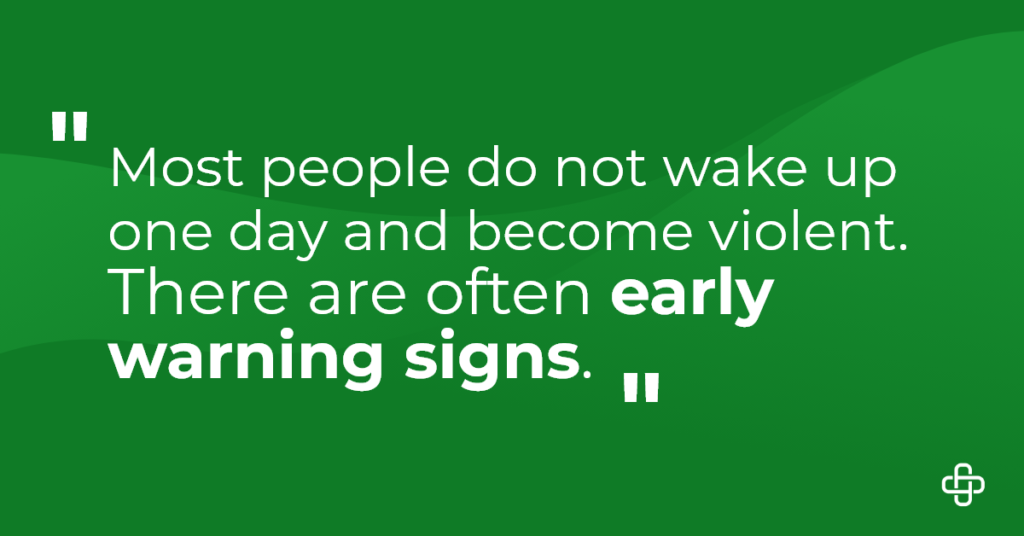Nobody ever wants to think about the possibility of being a part of workplace violence, yet it is a reality that every employee and manager should be prepared for.
Workers need to feel safe while on the job, and it is the employer’s responsibility to provide that level of security.
Understanding Workplace Violence
Workplace violence is a term given to the broad range of aggressive behavior that can occur in a workplace.
It includes violence or aggression against co-workers, clients, and even customers. It can be verbal or physical and can cause harm to the individual or organization.
It is essential to understand the signs of workplace violence before it escalates.
Identifying Early Warning Signs of Workplace Violence
Recognizing the warning signs of impending violence in a co-worker can be essential to prevent harm.
Most people do not wake up one day and become violent. There are often early warning signs.
Early warning signs of workplace violence can often surface in subtle, seemingly innocuous mannerisms or behaviors and might include:
-
- frequent and unexplainable mood swings
- noticeable increase in unsolicited comments about violence
- explicit or veiled threats made to colleagues
- fascination with incidents of violence, weaponry, or other related subjects
- intimidation of others
- a propensity for holding grudges
- an inability to handle criticism or rejection
- chronic absenteeism or decreased productivity without a clear
It’s important to remember that these signs do not definitively indicate a propensity towards violence but rather suggest a potential risk that warrants further attention and appropriate intervention.
Supervisors and managers should take the lead in recognizing these signs in their co-workers and intervene promptly.
Prevention Strategies: Training and Conflict Resolution
Training and Education
Training and education play a significant role in the prevention of workplace violence. Employees should be adequately trained to identify and report early warning signs.
They should know the right channels for reporting such incidents and have access to counseling services to help them deal with the aftermath of such events.
Organizations must create a culture of zero tolerance towards any form of violence in the workplace.
Conflict Resolution Across Industries
Manufacturing, Construction, Oil and Gas: Employees in these fields should be well-equipped with conflict resolution skills, given the high-stress and potentially hazardous environments. Clear communication, understanding, and resilience should be fostered to effectively handle disagreements that may arise in these sectors, especially during times of operational changes or crisis.
Healthcare: The healthcare sector can often be fraught with high tensions due to its inherent nature. Training staff to de-escalate conflicts and to set clear protocols regarding threatening or unreasonable patients or relatives can help maintain a safer environment.
Retail: In the retail industry, where customer interaction is an everyday necessity, employees should be proficient in conflict resolution to effectively handle any scenarios of customer dissatisfaction. Policies should be in place to guide staff when dealing with customers who may escalate situations.
Transportation: Conflict resolution skills are essential to navigate disagreements or threats within the transportation industry, whether it be public transit or shipping companies. Employees should be trained to handle difficult situations with passengers or clients, and security personnel should be on hand for higher-risk contexts.
Restaurants: The restaurant industry, marked by its high-pressure environment and direct customer contact, requires adept conflict resolution skills. Employees and managers alike should be trained to manage customer complaints effectively, turning potential conflicts into opportunities for improvement. Additionally, since kitchen staff and waitstaff often work under intense pressure, techniques for internal conflict resolution should be prioritized.
Across all these industries, the organization should consider employing security personnel or trained professionals to manage potential threats, depending on the risk level of the specific sector.
Support and Assistance
Providing support and assistance to employees who have been involved in workplace violence is crucial. They may suffer from post-traumatic stress disorder (PTSD) or other emotional and physical injuries.
It is essential to have counseling and support services to help those employees deal with the aftermath of such incidents.
Creating a work environment that prioritizes employee welfare reduces the chances of such occurrences happening again.
Preventing workplace violence should be a top priority for every organization. Creating a safe work environment where employees feel safe and supported is paramount.
By understanding the early warning signs, training employees, having conflict resolution measures, and supporting affected employees, the organization can help prevent workplace violence.
Deep dive into the crucial topic of workplace safety, gain expert insights, and arm yourself with actionable strategies. Watch our webinar replay, “Red Flags: Early Warning Signs of Workplace Violence,” now and take the first step towards ensuring a safer and more secure working environment.
Red Flags: Early Warning Signs of Workplace Violence Webinar
Are you aware of the red flags that signal workplace violence? With over 37,000 injuries each year attributed to this issue, it's vital for organizations to be prepared.
Charli Pedersen is a published writer featured on Axiom Medical’s blog. She holds a bachelor’s degree in English, Professional and Technical Writing, and has experience creating content for businesses and non-profit organizations.











